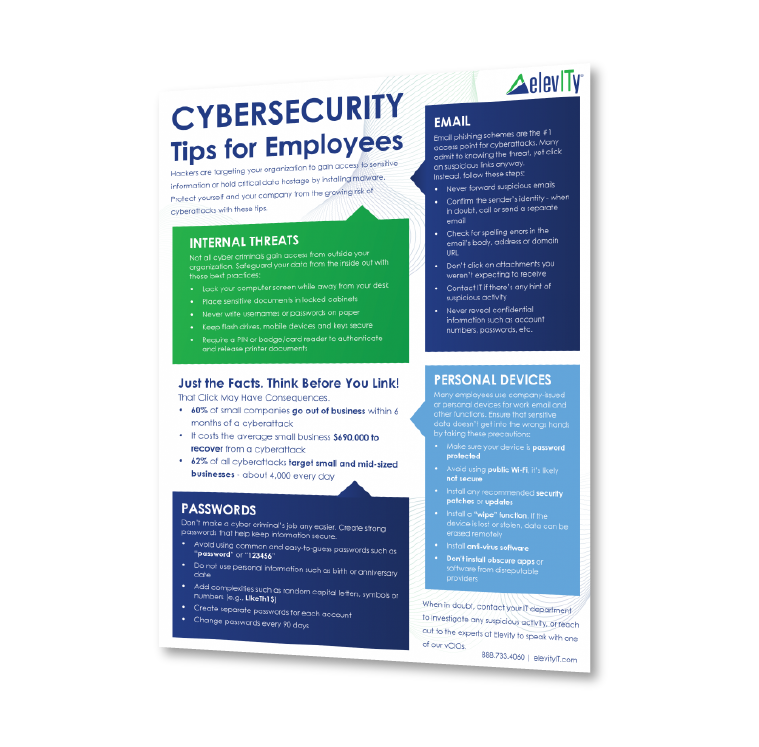No matter the size, all businesses have a massive amount of important data, and that data is always at risk of becoming compromised, stolen, deleted, or lost. You can reduce this risk with the use of security software and other tools but when all else fails a good disaster recovery plan and backup of critical systems is all that stands between a minor incident and business altering catastrophe.
Businesses should perform regularly scheduled backups of their business data. This could be monthly, weekly, or daily. The frequency you choose depends on the size of your data set, how quickly your data changes, and tolerance for data loss. If you backup on a weekly basis on Friday night and have a failure on Thursday you will have lost a weeks worth of work. Is that acceptable? We’re seeing an increasing trend of organizations backing up their data multiple times per day because the cost and impact of losing just one day’s work would be detrimental.
The more frequent the backup, the faster your business will be able to recover from a cyberattack, human error, natural disaster, theft, hardware failure, or data corruption.
What is a Backup & Disaster Recovery (BDR) Solution?
A BDR Solution involves making a copy of your business’ data at a given point in time. It protects your data and stores it in case you ever need to recover files, folders, or an entire system.
The 3-2-1 backup rule is an industry standard that many businesses have adopted as a part of their best practices. This involves:
- Maintaining 3 copies of your data One is the primary production copy of data. What users interact with on a daily basis. Two is a local copy of data that can be used for quick restoration. Three is an offsite copy of your data to protect against a catastrophe that destroys all onsite data. Think fire, flood, tornado, etc.
- Saving your backups to 2 different types of media (e.g., an external hard drive, Network Attached Storage [NAS] drive or DR appliance)
- Keeping at least 1 copy of your 2 backups file offsite. This is typically and most conveniently this would be in the cloud.
Backups can be manually generated or automated. Some businesses prefer to manage BDR solutions in house by their existing IT team. However, businesses are increasingly recruiting the help of an outside partners to take on this task. Often, this is done to reduce the burden on their internal staff.
Learn More: Beware of These 4 Most Common Cyberattacks
Why a BDR Solution is Crucial
Without a proper BDR solution in place, your business could be at risk of losing time, money, customers, and reputation. The impact of which could be devastating to your business. In the event of an incident, your IT experts could be tied up repairing the damage to your operating systems and restoring data for days or weeks. All the while your employees will be scrambling to figure how to work without the systems and data that they rely upon.
This can quickly be complicated by any regulatory requirements that may govern your business. It’s not out of the question that you may be held liable for the data loss and government regulations are increasingly holding businesses liable for not properly managing their data.
You must also consider any auditing processes that may be required to complete. Often times you are required to provide documentation of how you protect your data and the efficacy of your DR solution. This includes proof of regular testing and resolution of failures.
A Backup and Disaster Recovery solution is crucial for business. We all experience data loss as a result of any number of predictable or unpredictable events and a solid BDR solution is the difference between a hiccup and major business altering event.
Data Backup Organizational Procedures
Ready.gov recommends backing up data “as frequently as necessary to ensure that, if data is lost, it is not unacceptable to the business.” Be sure to designate a frequency for when you’ll back up your data and create a procedure outlining:
- How the backup will be done
- How it will be validated
- Where it will be stored
- Who will be responsible for completing the task
- Who will be responsible for testing backup data
- Who will have access to the backups
- Who will complete the recovery if needed
Stick to your backup schedule to reduce the gaps in your data available for recovery. You will be better prepared in the event of a data loss.
It is also advisable to maintain a secure offline copy of your BDR policy and restore plan. Often time having this printed is the best option. This help to ensure that if all systems are down and unavailable, you still have access to the plan and you are not trying to remember or create this plan under the stress and pressure of restoring systems.
Learn More: Endpoint Detection and Response vs. Antivirus Software
Competitive Advantages for Your Company
Where and when appropriate your BDR strategy can be shared with vendors and clients. This tells customers and prospects that you don’t leave anything to chance – it says you are diligent about the security of your data and theirs. And, when disaster strikes you are ready and prepared.
Developing an Overall IT Strategy
Outsourcing to a knowledgeable technology management provider could be the best choice for your company. Whether you’re searching for a fully-managed or co-managed solution, Elevity IT is here to help develop and deploy the right strategy for your business.
A vCIO is your IT expert ready with the information you’ll need to implement strategies and solutions. They can also help you form a strategy that aligns with your budget and business goals.
Working with Elevity, you benefit from our holistic 4S approach (Strategy, Security, Solutions, and Support) to Technology Management. This way of working through technology helps organizations of all sizes achieve a mature and healthy IT environment.
Wondering how a Traditional IT department compares to a Technology Management approach? Click the link below to download our infographic and learn more about Traditional IT vs. Technology Management.








